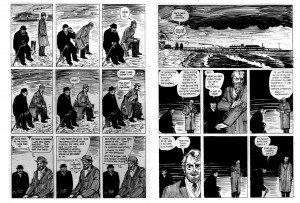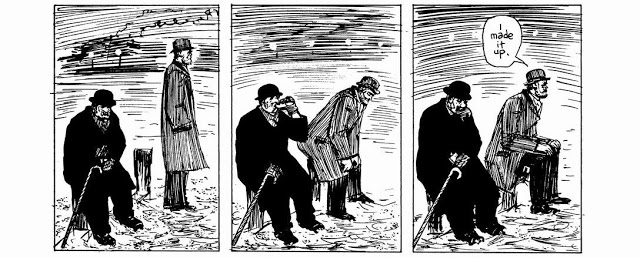
The story goes that somewhere on the West Coast of Africa, sometime in the 17th Century, some Portuguese colonials came upon natives worshiping idols made of wood and clay. “Have you made these yourself?” the Portuguese mockingly asked. The Africans answered in the affirmative. “Are they true Divinities?” Again, affirmative. “They cannot be both!” the Portuguese exclaimed, but the Africans simply didn’t see the distinction. The Portuguese laughed at their ignorant beliefs, and went back to their ships, their crucifixes and their saints (Latour 2010, 2-3).
I met Bruno Latour in the lobby of a swanky hotel in Edinburgh’s West End, where the receptionist was quick to ask if he could help mainly because I was clearly an outsider. Nor is continental philosophy or the anthropology of science an area of expertise for me. But I’d been exploring. In a week I’d read three of his books, including the proof of his then-forthcoming Rejoicing: On Religious Speech, which seemed a departure from his works on the philosophy of science, and Latour had provided me with the full text of his lecture series. I later discovered that mine was the only interview he’d undertaken while in the city.
I was extremely curious how an anthropologist of science comes to be giving the Gifford Lectures. Established in 1888 to ‘promote and diffuse the study of Natural Theology in the widest sense of the term”, previous presenters have included such luminaries as William James, Wilfred Cantwell Smith and E. B. Tylor. A year on, I still don’t understand Latour’s argument about Gaia. But a few things from my readings have resonated with things I’d been thinking about in the meantime.
The Dark Continent
RS has been slow to pick up on the work of European sociologists; although Foucault and Bourdieu are becoming familiar names, Hervieu-Leger, Beyart and Latour himself are little known in Anglophone academia, with their books appearing in English sometimes twenty years after their native publication. (That I cannot read them in their original language is partly my own failing and partly the fault of a post-imperial education system which saw European languages as less important than English—see how easily I wield post-structuralist critique?) And this affected Latour too; while Rejoicing seems like an unexpected direction after We Have Never Been Modern and Factish Gods, in the original French, Rejoicing came first, lending the later works a somewhat different reading. In fact, Latour, who identifies as a Catholic, began his academic career in Biblical Studies, which lends the destabilisation of the apparent certainties of modernity in his later writings a different perspective.
Rejoicing is an unusual book for Latour, personal, confessional, almost sermon-like. Ostensibly, it concerns not “religion”, nor “religions” but the adverb “religiously”; what does it mean to talk religiously? Is it still even possible?
Latour interview, Part 1:
Latour’s answer is yes, but not in the way one might expect. Rejoicing is at the same time a fierce attack on religions;
We have to go through this fundamental disappointment: religion leads nowhere. It is the absolute opposite of social or sociologizing explanations that think they’ve explained the need for religion as a bid to fill a world that’s too empty or, conversely, according to the chosen metaphor, as a means of carving out a bit of transcendence in a world that’s too full (2013, 33).
Latour argues that religion is not, never was, about the far-away things; rather, that is properly the domain of science. Religion should be about the near things, the everyday. I don’t know if I agree, but this simple shift of emphasis seemed to me a radical departure from how debates about the role of religion in modernity are typically framed. Rather, Latour suggests, religion is a way of speaking; a kind of language, if you will, about the everyday certainties of existence;
For instance, the word ‘God’, which once served as the premise of all arguing, could have been translated, when ways of life changed, as ‘indisputable framework of ordinary existence’ so that we could continue to really see that what was thereby designated was merely the preliminary and prelude to a conversion of meaning (2013, 8).
However, our invented scholarly creation—the category “religion”—comes back to bite us, and becomes real as agents begin to take sides in the argument;
But instead of this direct, painless, progressive translation, they started clinging for dear life to the term ‘God’ and pitting it against ‘non-God’, without seeing that they were dealing with two forms about as different as God, Deus and Theos for translating the same everyday reality. Thinking they were protecting their heritage, they squandered it (2013, 8).
Factish Gods
In Factish Gods, Latour argues that most critical writings on culture take one of two positions; “the fact position and the fairy position” (2010, 237). The fact position argues that categories of belief are merely empty terms onto which power is projected; alternatively, the “fairy position” has it that there are in fact forces which dominate and motivate individuals, albeit without their conscious acquiescence. To take just one of these categories, RS is largely split between those who see religion as a sui generis category, a thing in itself which exerts power over individuals, and those who see it as a socially constructed but powerful category (and I include myself in the latter camp).
…while there is a staggering amount of data, phenomena, of human experiences and expressions that might be characterized in one culture or another, by one criterion or another, as religion—there is no data for religion. Religion is solely the creation of the scholar’s study. It is created for the scholar’s analytic purposes by his imaginative acts of comparison and generalization. Religion has no existence apart from the academy (Smith 1982, xi)
Latour, however, is attempting to construct a third way. I asked him about this quote from J. Z. Smith; he replied that he was correct, religion is a constructed category, but that didn’t mean it wasn’t also real. So Latour takes the constructionist agenda of the post-structuralists a step further. Our categories are indeed invented, but not “merely” so, for they are also real. They become real through our wielding of them.
I have to be able to talk about religious elaboration without threatening voices, coming from inside as much as outside, immediately asking me to choose: ‘Is it real or is it made up?’ I have to be able to answer once more: ‘Both’ (2013, 144).
Just like the founders of Discordianism found. A few years after inventing their parody religion, Greg Hill stated that “if you do this type of thing well enough, it starts to work… If you take a goddess of confusion seriously, it will send you through as profound and valid a metaphysical trip as taking a god like Yahweh seriously” (Adler 1986, 335). As Kerry Thornley, ever playful, put it, “if I had realised that all of this was going to come true, I would have chosen Venus” (Adler 1986, 336).
So Latour argues that we have the categories wrong. Rather than seeking to “extend Science over religion’s territory through an offensive apologetics, or to protect religion’s territory from Science through a defensive apologetics” (2013, 24), Latour challenges the basis of these demarcations. There is no boundary between “manufactured” and “real”, between “knowledge” and “belief”. Latour’s work argues that we all, ostensibly religious or not, have an epistemology based on invented certainties. We have never been Modern. None of us hold beliefs that are any more naive than anyone else’s. There are other ways to think about religion, beyond the simple dichotomies which populate the field and that many of us are so tired of.
Latour interview, Part 2:
The future of the discipline, in short, whether RS can demonstrate its utility to the broader academy, may depend on us getting over such false dichotomies—religious/secular, faith/knowledge, object/subject, fact/fetish, invented/real. We need to stop talking about how some people believe, and instead analyse our multiple, competing, situational, invented epistemologies.
Actually, I’m not sure this is what Latour means at all. I just made it up.
It’s turned quite cold, hasn’t it? Shall we be heading back?
References
Adler, M. (1986). Drawing down the moon: Witches, Druids, goddess-worshippers, and other pagans in America today. Boston: Beacon Press.
Latour, B. (1993). We have never been modern. Cambridge, Mass: Harvard University Press.
Latour, B. (2010). On the modern cult of the factish gods. Durham: Duke University Press.
Latour, B. (2013). Rejoicing: Or the torments of religious speech. Cambridge: Polity Press.
Moore, A., & Campbell, E. (1994). From hell. Northampton: Mad Love Pub. in association with Kitchen Sink Press.
Smith, J. Z. (1982). Imagining religion: From Babylon to Jonestown. Chicago: University of Chicago Press.



